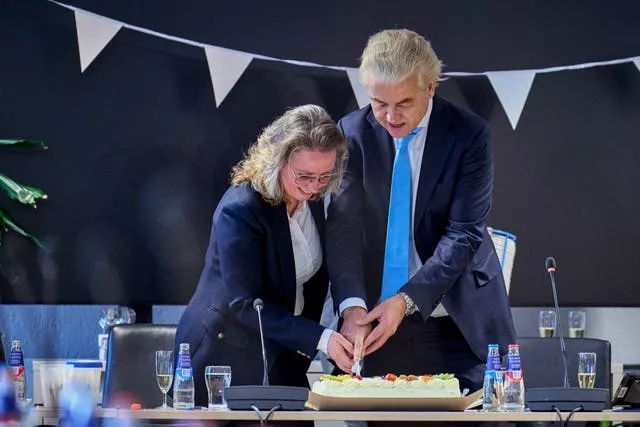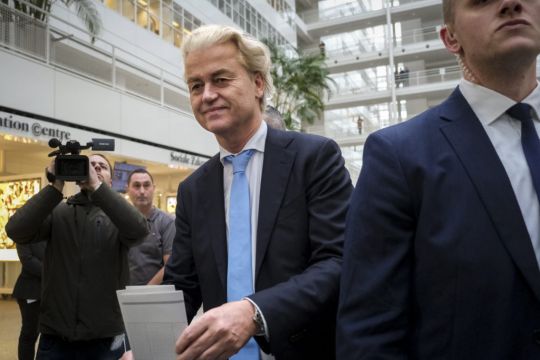Anti-Islam populist Geert Wilders has said he is ready to join the next Dutch coalition government after he surged to a huge election victory that marked a stunning lurch to the far right for a nation once famed as a beacon of tolerance.
The result is sending shockwaves through Europe, where extremist nationalist ideology is putting pressure on democracies which face having to deal with the first far-right prime minister of the Netherlands.
“It is going to happen that the PVV is in the next cabinet,” Mr Wilders said, using the Dutch abbreviation for his Party for Freedom.

With nearly all votes counted, Mr Wilders’ party was forecast to win 37 seats in the 150-seat lower house of parliament, more than double the 17 the party secured in the last election.
He received a standing ovation, cake and sparkling wine when he met his legislators at the parliament building on Thursday morning.
“Can you imagine it? Thirty-seven seats!” he said to cheers.
Other political parties were holding separate meetings to discuss the election’s outcome before what is likely to be an arduous process of forming a new governing coalition begins on Friday.
Mr Wilders’ election programme included calls for a referendum on the Netherlands leaving the European Union, a halt to accepting asylum-seekers and migrant pushbacks at Dutch borders.
It also advocates the “de-Islamisation” of the Netherlands. He says he wants no mosques or Islamic schools in the country, although he has been milder about Islam during this election campaign than in the past.
One of the most prominent Muslim organisations in the Netherlands said it had received emails expressing support since the election result.
“That’s reassuring,” the Contact Group Muslims and Government said in a statement. “In addition, Mr Wilders has said that he will become prime minister of all Dutch people, regardless of their religion, sex or colour.
“The Netherlands is a state governed by the rule of law and we trust that it is a tolerant country.”
Although known for his harsh rhetoric, Mr Wilders began courting other conservative and centrist parties by saying in a victory speech that whatever policies he pushes will be “within the law and constitution”.
His victory appeared based on his campaign to curtail migration — the issue that caused the last governing coalition to quit in July — and to tackle problems including the Netherlands’ cost-of-living crisis and housing shortages.
In his victory speech, Mr Wilders said he wanted to end what he called the “asylum tsunami”, referring to the migration issue that dominated his campaign.
“The Dutch will be number one again,” he said. “The people must get their nation back.”
To become prime minister of a country known for compromise politics, the politician sometimes called the Dutch Donald Trump must persuade other party leaders to work with him in a coalition government.
That will be tough since mainstream parties have long been reluctant to join forces with him and his party, but the size of his victory strengthens his hand in any negotiations.
Mr Wilders called on other parties to engage constructively in coalition talks. Pieter Omtzigt, a former centrist Christian Democrat who built his own New Social Contract party in three months to take 20 seats, said he would always be open to talks.

“It will be a complicated formation process. It is up to responsible politicians to form a government, one way or another,” he said, according to Dutch news site Nu.nl.
The party that finished behind the PVV in the election was an alliance of the centre-left Labour Party and Green Left, which was forecast to win 25 seats, but its leader, Frans Timmermans, made clear that Mr Wilders should not count on him as a partner.
The election was called after the fourth and final coalition of Mark Rutte, who resigned in July, failed to agree on measures to rein in migration. He has been in office for 13 years, making him the Netherlands’ longest-serving leader, and plans to step down once a new coalition government is formed.
Mr Rutte was replaced as the head of VVD by Dilan Yeşilgoz-Zegerius, a former refugee from Turkey who could have become the country’s first female prime minister had her party won the most votes. Instead, it was forecast to lose 10 seats to end up with 24.
She said the PVV and Mr Omtzigt’s party should take the initiative in talks to form the next coalition.







